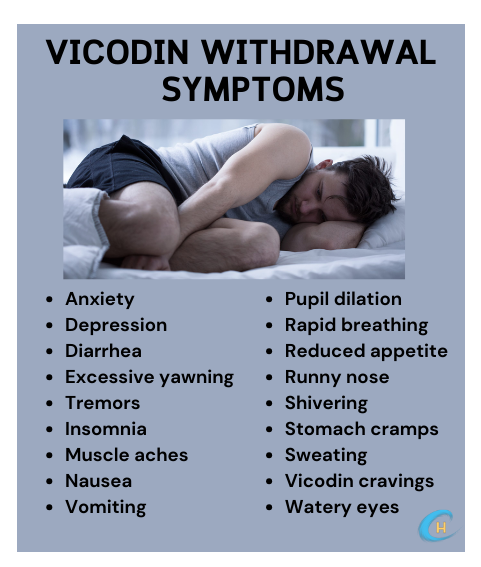How long does Vicodin stay in your System?
Vicodin is a popular prescription medication often used to treat moderate to severe pain. Vicodin contains the over-the-counter ingredient acetaminophen and the opioid hydrocodone. This medication is so commonly prescribed because of its ability to treat a wide range of conditions including arthritis pain, side effects of cancer and sometimes persistent coughing.
Acetaminophen is also the main active ingredient in Tylenol. Hydrocodone is a synthetic opioid derived from the opium poppy plant and is considered highly potent with a high risk for misuse and addiction. The combination of hydrocodone and acetaminophen is often referred to as an opioid narcotic. Acetaminophen is a much less potent pain reliever, but when used with hydrocodone, it increases the effects of the opioid.

Vicodin is the brand name of the medication and is often referred to simply as hydrocodone. Hydrocodone is a strong opioid drug that works by blocking pain signals in the brain to allow the user to experience calmness, reduced anxiety and pain relief. Because of these effects, Vicodin has a high potential for abuse. It has been a contributing factor in the decades-long opioid overdose public health crisis for many years. Studies from the National Library of Medicine suggest that almost 3 million Americans and 16 million people globally have or are currently experiencing opioid use disorder.
What is Vicodin?
Vicodin is a Schedule II Controlled Substance due to its potential for addiction. From 2000 to 2010, the production of prescription painkillers such as Vicodin increased significantly. This is part of what led to the opioid crisis in America. Another factor was due to the overprescribing of opioids. An estimated 131 million Americans were unnecessarily prescribed Vicodin in 2011.
Common side effects of Vicodin misuse include drowsiness, dry mouth, fatigue, headaches, high blood pressure, depressive disorders, heart attack, stroke, weakened immune system, digestive conditions, anxiety disorders, seizures and diabetes. Another major side effect of abuse is liver damage. Acetaminophen is processed in the liver and when doses of 4000 mg or more a day are being ingested, this can cause a severe toxic build-up of the drug in the body. The liver isn’t able to process the drugs normally leading to a high risk of drug overdose.

How long does Vicodin stay in your system?
How long a drug stays in your system is actually dependent on each individual user. Everyone has a unique metabolism as well as different contributing factors that can affect how long a drug circulates within the body before it is fully removed. On average, it takes the body about 24 hours to fully process Vicodin from the system. The half-life for hydrocodone is about 3-4 hours and the half-life for acetaminophen is about 1-3 hours. The half-life of Vicodin is about 3.8 hours.
Users can begin to feel the effects of the drug in between 10-30 minutes, where the peak of the effects takes place between 30-60 minutes after the first dose. The effects of Vicodin can last between 4-6 hours and with an extended-release formulation, it can last up to 12 hours. However, traces of the drug can still be detected long after the effects and the drug has worn off.
According to the American Addiction Center, traces of Vicodin can be detected in blood for up to 18-24 hours after the initial dose. It can be detected in saliva between 12-36 hours after the initial dose. And it can be detected in a person’s urine for up to 4 days after the initial drug dose.
Many different factors can contribute to how long Vicodin stays in your system:
- Dosage – Higher doses make it more difficult for the body to process and cause the drug’s metabolism to slow down.
- Frequency of use – Long-term users will also find processing of the drug more difficult and can take longer because there are already heavy amounts of drugs within the bloodstream.
- Age – Younger people have a faster metabolism compared to older adults
- Genetics – A user might have a history of drug use or other genes that can disrupt the metabolic processing of substances.
- Kidney and liver health – Both hydrocodone and acetaminophen are processed in the liver. When there is too much of the substances, it causes a back up and build-up of toxins in the body and the body is unable to process substances normally.
Check Your Insurance Coverage for FREE
Find out if your insurance covers addiction treatment in minutes. We accept most insurance!
Types of Hydrocodone
- Immediate Release formulation – This is usually prescribed for patients experiencing acute pain after surgery. The effects of the drug occur within 30 minutes and can last anywhere between 4-6 hours.
- Extended Release formulation – This drug is usually prescribed to provide pain relief for chronic pain conditions that may require around-the-clock treatment. The effects of this drug can last for up to 12 hours.
- Oral administration of Vicodin – When taken via tablets or capsules, the effects of the drug will begin within 30 minutes to an hour. The effects from the tablet or capsule are less intense and have longer-lasting power compared to other administration methods.
- Injections of Vicodin – When users crush tablets and dissolve them in water, they can inject this solution directly into the bloodstream. This causes the release of immediate and intense effects. However, this method only lasts between 2-3 hours. It also puts users at a higher risk for overdose because once the effects wear off, they are more inclined to take more even before the body has fully processed the drug from the previous dose.
- Inhalation of Vicodin – When users snort the drug, it causes a quick and extremely intense high. The tablets are crushed into powder and snorted through the nose. With this method, the effects can begin within minutes and last a few hours.
Vicodin vs Norco
Another hydrocodone and acetaminophen drug combination is known as Norco. Both Vicodin and Norco are opioid painkillers that consist of both ingredients. However, Norco often contains larger amounts of hydrocodone compared to Vicodin. While Vicodin contains larger concentrations of acetaminophen compared to Norco. Generic forms of Vicodin are typically available in tablet form and generic forms of Norco are available in both tablet and liquid form. Both medications should only be used for short-term pain relief.
Reach out to Hotel California by the Sea
We specialize in treating addiction and other co-occurring disorders, such as PTSD. Our Admissions specialists are available to walk you through the best options for treating your addiction.
Treatment for Opioid Use Disorder
Painkillers such as Vicodin are common drugs found in opioid-related overdoses and deaths. The drug has a high potential for dependence and misuse. Hotel California by the Sea offers a rigorous treatment program that focuses on substance use disorder and specifically on prescription painkillers. An addiction to opioids can be very difficult to overcome. The United States is currently battling a decades-long public health epidemic against opioid overdose. And behavioral health programs such as ours are stepping up to help ease the crisis.
We offer medically assisted detox, residential inpatient care, PHP and IOP treatments. Our program also utilizes evidence-based programs such as DBT, CBT and marriage and family therapy. These treatment methods have been proven to show successful ongoing results in patients who step into our recovery program. Hotel California by the Sea is committed to providing the necessary support and resources for clients to achieve sobriety and long-term recovery.
References:
https://www.medicalnewstoday.com/articles/325877
https://anrclinic.com/blog/how-long-does-vicodin-stay-in-your-system/
https://www.bicyclehealth.com/opioid-education/hydrocodone/how-long-in-your-system
https://www.healthline.com/health/how-long-does-hydrocodone-stay-in-your-system
https://zinniahealth.com/substance-use/hydrocodone/duration
https://www.drugs.com/vicodin.html
https://www.addictioncenter.com/opiates/hydrocodone-addiction/vicodin/
https://www.verywellhealth.com/vicodin-vs-norco-7558267
